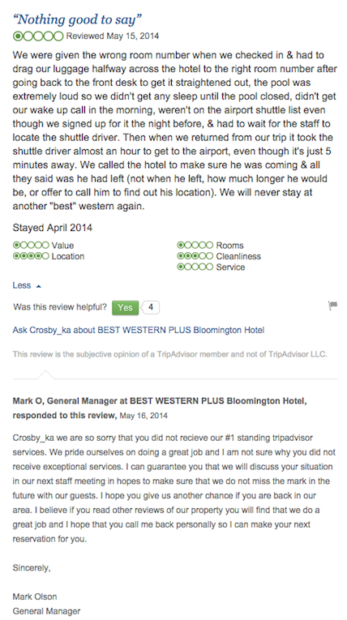How to Win over Guests with Online Reviews

As a hotel manager or team member, life gets busy, right? However, making time to gather and respond to reviews (when appropriate) is an important part of your customer satisfaction and marketing efforts. You need to strategize how to get five-star reviews, and even get disgruntled customers to come back.
Why should hotels care about online reviews?
Reviews appear in search (and they’re eye-catching!).
People browse hotel options online. According to a local search study by Google, 4 out of 5 consumers use search engines to find local information—and hotels are a local business.

Potential guests use online reviews to make decisions.
Almost 9 out of 10 consumers read reviews when choosing a local company to go with, according to a 2014 Local Consumer Review Survey by BrightLocal. These consumers also trust the reviews they find as much as a personal recommendations, according to the study. If your reviews aren’t up to par, you could be losing 88% of web traffic that references reviews.
Reviews give you an opportunity to showcase your customer service.
If the opportunity arises to respond to negative reviews publicly, and you can right wrongdoing, take advantage of it. In many cases, previous guests want to hear from you. Additionally, if you publicly respond to a review and explain the situation, potential customers who stumble upon that review will see your customer service at work. They’ll know that you’re in the business of making guests happy. Who knows, you may even get that disgruntled customer to change their review and come back. Three-quarters of consumers complete a call to action after reading a great review, according to BrightLocal. So if you have some not-so-great reviews out there, you can still try to minimize damage and prevent losing bookings.
What kind of reviews require attention?
Consumers have mixed feelings regarding when it’s appropriate to respond to reviews, both positive and negative. Local search expert Mike Blumenthal wrote an article for Local University—a top resource to learn about online local search—after surveying 560 reviewers on when businesses should respond to reviews. Regardless of the review content, some thought that businesses should always reply. Others said only negative reviews warrant a reply (of course others were on the opposite side of the spectrum and preferred no reply). Finally, some said that the need for a business to respond will vary by situation. So what’s the bottom line? Use your best judgment, based on the situation, regarding whether or not to respond publicly, privately, or at all. Again, if you can add context to a situation and attempt to make things right, it may be worth a shot!
How do hotels gather positive reviews?
While you cannot incentivize customers to provide reviews, you can incentivize your staff to give the best service possible (in return to get the best customer review). When guests check out at the front desk, ask how their stay was. If they loved it, ask them to review your hotel online, if it’s not too much trouble. You can ask them to leave it on Google (the best option), TripAdvisor, or the online travel agency (i.e., Expedia) they used to book their stay, if applicable. By providing an exceptional guest experience, you property should naturally gain a lot of positive reviews over time, too.
Good reviews are great, but how should hotels deal with negative reviews?
Yes, negative reviews happen—but you can turn something negative into a positive with strategic wording (in many cases). According to BrightLocal, reliability, expertise, and professionalism are the most sought after business characteristics that consumers look for. You can gain some, or all three, of those qualities back by putting some thought behind your response to a review. This can be applied to both public and private review responses.
Professionalism
No matter what the situation entailed to get a customer to leave a negative review, use a professional tone when drafting your response. Start your response by using the guest’s name or username. Show your sincerity, knowing that the guest went out of his or her way to leave a review, and thank him or her, too.
Reliability
Genuine, heartfelt responses let the reviewer and potential guests know customer service is a top priority for your hotel. You can demonstrate reliability by letting the reviewer know that your hotel wants to deliver its promise of great customer service—and that when you don’t live up to expectations, you want to fix it. In your response, address the specific situation and let him or her know you are sorry (if it was your fault). Cutting and pasting the same response time and time again sounds insincere. Write unique content every time.
Expertise
As a hotel, servicing guests and making their stay enjoyable is where you shine. As a hotel manager, you have the power to address dissatisfaction. Let the reviewer know about your standard of service and that what they experienced doesn’t sit right with you. Add your name and title at the end of the review, too.
If desired, you can also respond to positive reviews to thank guests for taking the time to do so. Again, try not to be cookie-cutter.
Here are two real examples from a Regency property that responded to a positive and negative review on TripAdvisor:


What makes these good responses?
In the positive review example, the general manager thanked the guest for taking time to leave a great review.
In the negative review example, the general manager thanked the reviewer for taking the time to explain the situation, addressed the specific issue, apologized, and let the guest know how he plans on handling the situation. The general manager also asked for another chance to make things right and personalized the reply by leaving his name.
Frequently visit sites such as TripAdvisor, Expedia, or Google My Business to monitor reviews. You can also create Google Alerts that send you an email when someone mentions your hotel name. This will not let you know about every mention, but it’s a good way to monitor some of the online chatter surrounding your hotel name.
Make it a habit of regularly looking at reviews. You don’t want to wait too long to respond or let them pile up. A little reputation management can go a long way when it comes to keeping guests happy and more coming in the door.

